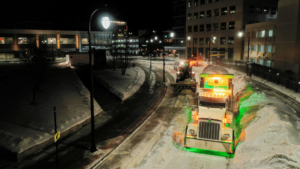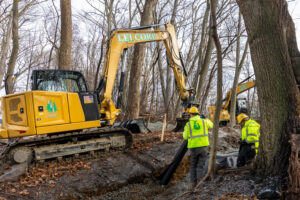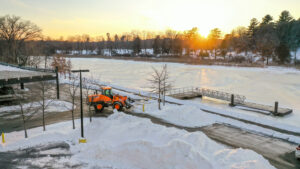Winter is truly a season you can relax with your landscape maintenance. But you still have to put in some effort to support your plants through the cold season. You can do many things to boost your plants’ survival chances. Likewise, there are many things you should avoid to protect your plants from unnecessary damage. If you know these things and act on them, your landscape will be ready for a quick bounce back in spring.
Want to make your commercial landscape look good in winter and survive the drought? Below are the lists of the good things you can do and what to avoid in winter.

The Do’s
Wrap-Up Delicate Plants
If you have tender plants that can get damaged by winter frosts, protect them by wrapping them up. Covering plants with unbreathable materials can cause more damage, so you must carefully select the right wrapping material. Burlap is one of the best materials for wrapping plants. It promotes air circulation, and it doesn’t trap heat. If you don’t have access to burlap, avoid using plastic or dark materials, as they can trap heat.
Mark Your Lawn
One of the challenges of caring for a commercial landscape in winter is the difficulty of identifying where it ends. Especially when you have another building’s landscape overlapping yours or you can’t identify where your lawn, the driveway, and the sidewalk ends. Identifying where your landscape ends is important because — you need to know where to shovel and where you shouldn’t be shoveling or blowing to avoid damage.
For easy identification, add markers where your commercial landscape ends. You can also add reflectors to the street line of your commercial property. Think about marking your landscape like marking territory. You would always want to protect your territory, right?
Water Your Plants Regularly
Although most of your plants are dormant in winter, they still need water. Particularly the ones that get dry easily. It is necessary to keep them moist to prevent dehydration. Generally, plants’ roots need moisture; you should regularly water all plants on your commercial landscape. Watering your plant can help them pull through winter, helping them survive the declining soil moisture and extremely cold weather. Use cold water whenever you want to water your plants — warm water will cause sudden thawing, which can cause harm.
Monitor Recently Planted Plants
Like babies needing care and attention, new plants should not be neglected. New green additions in winter need your attention at the moment more than ever. If you abandon them, the winter frost can take a toll on them and damage their tissues. Things can even get worse — the temperature can drop drastically, and some new plants can get pushed out of the soil. To save such plants, put them back into the soil and insulate the area with some compost or mulch.

The Don’ts
Stop Weeding
Weeds can be annoying. Many of them even grow faster than the grasses on your lawn. And they can survive the toughest of winter conditions. You have an advantage over them in winter — since they grow slower in winter. So you can fight them off before they take over your commercial landscape in spring. Show no mercy to any weed in winter. When you see any plant that doesn’t look like your precious grasses, get rid of it. Want to make things easier on yourself and your gardener? Hire a business landscaper to care for your landscape needs, including weeding and other commercial landscape challenges.
Try to Save a Frozen Plant
That’s right. You do more harm than good if your try to remove the ice covering your plant. You might be worried about a frozen plant‘s survival, but it doesn’t need you to be its hero. It can save itself. Plants respond to cold temperature shock by moving water from their cells, making them freeze-dried. Removing the ice on plants causes a sudden change in temperature, which thaws the ice crystals in the plant tissues too quickly, leading to cell wall damage. Eventually, most cold-hardy plants won’t adapt to these changes, which badly affects their growth and survival chances.
Pile Snow on Your Plants
It may seem like something you can do, but don’t shovel or blow snow on your plants. It can ruin them! How? For trees and shrubs, the heavy weight of snow can break or split their branches, while excess snow suffocates smaller plants. Thus, you need to find somewhere else to dump the snow from the walkway and the driveway. This is why snow management is vital every winter season. Work with a business landscaper to create a solid plan for snow disposal. Leaving your snow removal to professionals will save you the time and energy needed for other crucial parts of your business.
Use Salts on Your Lawn
This is a common mistake people make. Salt is a universal icebreaker, but it can cause irreversible damage to your plant. Here is why — salt causes serious dehydration and loss of nutrients, which leads to tissue damage in plants. If it is necessary to deice your lawn, use sand or magnesium chloride. Stop anyone from using the common salt (sodium chloride) on your lawn unless the weather condition is extreme. In some situations (such as snow plowing), it might be difficult to control the exposure of some plants to snow. The best thing to do in that situation is to — remove the snow from the plants as soon as possible.
Overall, landscaping is easier in winter than in summer. Still, you need to monitor the condition of your trees, shrubs, and grasses. Our list of do’s and don’ts can be handy in preventing many commercial landscape problems in winter. If things get complicated, you can contact us for help. Or, let us handle all your commercial landscaping needs in winter from scratch. That way, you will prevent many winter landscaping and snow removal problems. As a competent New England landscaper, you can check all the winter landscape goals on your list with us.



